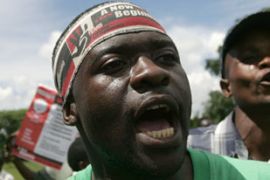Zimbabwe poll date riles opposition
Opposition accuses ruling Zanu-PF of undermining talks on constitutional change.

It was hoped that an agreement could be reached that would allow the polls to go ahead and ensure that the results were accepted by all sides.
“We’re currently deadlocked on three main issues: a new constitution, the political environment and election date, but he has proceeded to ambush us before the dialogue is completed,” Chamisa said.
The MDC has threatened to boycott the polls if they are not pushed back to June.
On Wednesday, police used tear gas to disperse a banned march staged by the opposition and pressing for political reform. Morgan Tsvangirai, the MDC leader was briefly detained before the demonstration.
Rigging accusations
Robert Mugabe, the president who will be running for a sixth term in March, has been accused of rigging previous elections and using tough security laws to keep his opponents under control.
| “The challenge is to continue pressing the Mugabe regime … to adopt a new constitution” Lovemore Madhuku, constitutional lawyer |
A statement in his name on Friday said: “Now therefore under and by virtue of the powers vested in the president as aforesaid, I do by this proclamation dissolve parliament with effect from midnight the 28 March 2008.”
Lovemore Madhuku, a constitutional lawyer leading a pressure group pushing for a new constitution, told the Reuters news agency that the election date came as no surprise.
“The challenge is to continue pressing the Mugabe regime – which, because of the twisted electoral environment, will still be there in the post-election period – to adopt a new constitution.”
The parliamentary and presidential elections will take place against the backdrop of Zimbabwe’s ongoing economic crisis. The annual rate of inflation is officially running at nearly 8,000 per cent, but many economists believe that the figure is closer to 50,000 per cent.
Unemployment is around 80 per cent and basic foodstuffs, such as cooking oil and sugar, are now a scarce commodity.